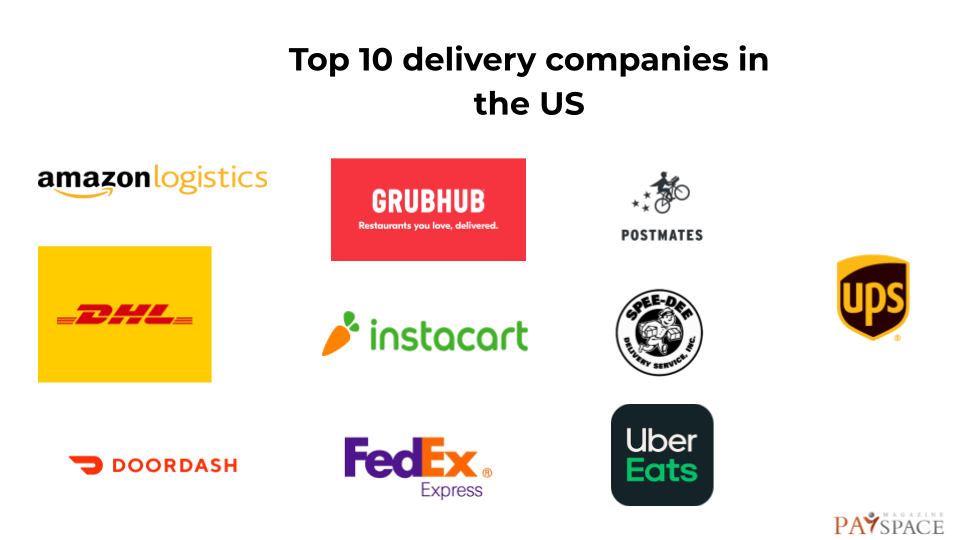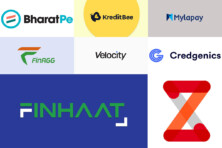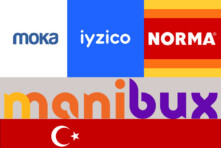Let’s track the industry dynamics with this top-10 list of the best delivery services in the US (in alphabetic order)

Top 10 delivery companies in the US. Source: pexels.com
Delivery companies are among the lucky businesses that have seen substantial growth due to the pandemic. For many restaurants, cooperation with food delivery services has become the only way to make the ends meet during temporary lockdowns that have become the new norm throughout the last year. Onsite-dining restrictions have been forcing more customers to eat their ready-made meals at home. Food-delivery apps have more than doubled their revenues lately. Third-party package carriers also profit from the increasing e-commerce sales, with autonomous technologies giving delivery services more room for growth.
Whereas some delivery companies have remained industry leaders for decades, recently emerging startups are showing robust competition.

1. Amazon Logistics
Market cap: $1.544T
Founded: 1994
Annual revenue: $386B
Amazon Logistics is a shipping and delivery service meant to complement existing shipment providers. It offers 7-day and same-day delivery options through third-party logistics partners – including courier drivers, walkers, cyclists, and motorcyclists in some areas. It operates in the US, Canada, Italy, Germany, Spain, and the UK. Except for SME partners, Amazon enables individuals to act as independent delivery contractors via Amazon Flex. Such deliveries include one or two-hour Prime Now, same or next-day Amazon Fresh groceries, standard Amazon.com orders, and orders from local stores that contract with Amazon.
2. DHL
Market cap: $56.105B (data of its parent company Deutsche Post AG)
Founded: 1969
Annual revenue: $77B
DHL International is a division of the German logistics firm Deutsche Post. Originally founded in San Francisco, the company was acquired by Deutsche Post in 2002. Headquartered in Bonn, the delivery service now operates in over 220 countries. As an industry leader, DHL has a few innovation centers where they develop and implement practical solutions like Resilience 360 risk management tool, SmartSensor monitoring for highly sensitive freight, EffiBot automated trolleys, Vision Picking AR tool, semi-automated container unloading, or omnidirectional automated package conveyor Celluveyor.
3. DoorDash
Market cap: $43B
Founded: 2013
Annual revenue: $2.9B (2020)
This food delivery startup provides a digital logistics platform connecting over 450,000 merchants with over 20 million consumers in the US, Canada, and Australia. It’s been the most popular meal delivery option in the US lately, accounting for 55% of the ordered food. DoorDash expanded its activities to grocery and convenience store deliveries in 2020. The company also offers subscription services to loyal customers. In late 2019, DoorDash partnered with Chase to give free DashPass memberships to millions of credit cardholders. Nevertheless, many critics consider DoorDash’s valuation a bubble that’s going to burst as soon as the pandemic ends. Its shares grew enormously right after the IPO (from $102 to $180 per share on the first day of trading) but went to a more moderate level once the hype faded away (about $130 now).
4. FedEx
Market cap: $70.742B
Founded: 1971
Annual revenue: $71B
The pioneer of quick delivery services has revolutionized global business practices. FedEx which stands for Federal Express is the premier delivery service not only in its native country but worldwide. Today FedEx Express has the world’s largest all-cargo air fleet delivering to customers in more than 220 countries and territories. FedEx is at the forefront of logistics innovation, implementing computer-assisted vehicles, artificial intelligence, robotics, and drones into its daily activities.
5. Grubhub
Market cap: $6.316B
Founded: 2004
Annual revenue: $1.8B (2020)
Grubhub connects diners with a variety of restaurants available near them. Overall, the platform hosts over 300,000 dining places in over 4000 US cities. Big national chains and small restaurants are on that list alike. Grubhub even partners with local Girl Scout organizations to deliver their cookies in times of limited personal contacts. Except for the vast partner network, the company’s customers also enjoy multiple payment options. A monthly subscription is available too. The anticipated acquisition of Grubhub by Just Eat Takeaway may become a major industry gamechanger. The combined enterprise will have over 70 million active customers globally, making it the largest food-delivery service in the western world.
6. Instacart
Market cap: private company, estimated valuation about $17.7B
Founded: 2012
Annual revenue: $2B
The service is one of the largest and most widely available in North America, covering urban areas in all 50 US states, and Washington D.C., as well as all Canadian provinces except Quebec. Amidst the pandemic, Instacart has expanded delivery services beyond its core by partnerships with new retailers including industry leaders like Walmart, 7-Eleven, and Sephora. However, its main service segment still is grocery delivery and pick-up. As most of the food delivery services, Instacart saw a huge upsurge in demand last year, requiring the company to add 250,000 more full-service personal shoppers to its already existing shopping team of 500,000 in order to speed up the service. Instacart’s full-service shoppers operate as independent contractors who pick, pack and/or deliver an order from a store to the customer’s door. Additional in-store shoppers are part-time Instacart employees who pick, pack, and stage items at a dedicated store.
7. Postmates
Market cap: acquired by Uber valued at $2.65B
Founded: 2011
Annual revenue: $500 million (2019)
Though acquired by Uber, Postmates will continue to operate as a separate service with its own branding and front end. At the same time, some back-end operations, including a shared pool of drivers, will merge. The company delivers from 600,000 various retailers, restaurants, and grocery stores, covering practically every customer’s need. The merchant listing system utilized by Postmates is unique. The company uses Foursquare’s API to locate restaurants and stores. Then, Postmates links consumers with a merchant’s website, takes orders, calls them into restaurants, and sends its couriers to pick them up. For the most popular places, they add the menu or inventory in-app so that it’s easier for customers to browse and order items. Those restaurants and stores that choose to partner with Postmates under the Merchant Program can establish the way couriers pick up and deliver orders, and discuss which meals are better suited for deliveries.
8. Spee Dee
Market cap: private company, valuation unknown
Founded: 1978
Annual revenue: $100-150M
Spee Dee Delivery Service Inc began its activities as a small local on-call delivery service. Today, it serves more than 12,000 shippers throughout 9 states, providing same-day and next-day package deliveries. Such a speed is possible due to the solid fleet of over 1,500 transportation vehicles. The packages are distributed across 60+ operational facilities and 4 sorting hubs. The company delivers everything from small parcels to building materials, including sensitive cargo such as special equipment and hazardous materials. It provides on-call pick-up, bulk shipments, and even warehouse storage.
9. Uber Eats
Market cap: $109.363B (Uber Technologies, Inc)
Founded: 2015
Annual revenue: $4.8B in 2020
Uber Eats is one of the largest food-delivery services worldwide. When its parent company Uber saw ride-hailing popularity slowly decreasing, it caught on a new money-making opportunity. Food delivery was just a side project before it got a standalone app which became the most downloaded food delivery mobile app in 2018. Its superior features include menu customization with the help of AI and machine learning, pre-order, data analytics tools for partners, push notifications, and real-time tracking, not to mention extensive dish details and customer reviews. Last year, the company added grocery deliveries to the list of services. It acquired the competing business Postmates to consolidate market share and boost profitability. Uber has also started testing unmanned drone delivery in partnership with McDonald’s in San Diego.
10. UPS
Market cap: $139.186B
Founded: 1907
Annual revenue: $84B (2020)
The United Parcel Service (UPS) is a package delivery and supply chain management business, headquartered in the US. This global company operates in over 220 countries worldwide. Aside from domestic and international package shipments, it also deals with airline cargo, freight operations, and drone delivery. UPS offers value-added services such as specific collection and delivery options, delivery notification, and special handling to meet peculiar shipping needs.
SEE ALSO:









